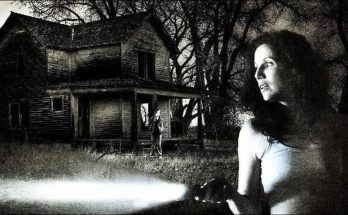Taglines: No one believes her. Nothing will stop her.
Jill Conway (Amanda Seyfried) is a young Portland woman who lives with her sister, recovering alcoholic Molly. One year prior, Jill was kidnapped by a serial killer who abandoned her in a hole in the forest, where she found human remains. When her abductor descended into the hole to kill her, Jill was able to stab him with a bone and climb his rope and return to civilization. However, the police didn’t find the hole and discovered that Jill had been committed to a psychiatric institution for several years after her parents’ death. Believing that the abduction only happened in Jill’s head, they closed the case.
One day, after returning home from work at a local diner, where she and her friend Sharon Ames are generously tipped by a regular customer about to move out of town, Jill finds Molly gone and is unable to reach her boyfriend, Billy. Knowing that Molly wouldn’t leave the house with Jill absent and that she had an important test the following day, Jill becomes convinced that the man who took her has now captured Molly and heads to the police station to ask for help, but Sargent Powers and Detective Erica Lonsdale dismiss her claims and promise to look into the case after a few days, but Jill claims it will be too late then. Before she leaves, newcomer Detective Peter Hood pulls her aside and tells her he believes her, giving Jill his card in case she needs help.

Billy calls Jill and tells her that he hasn’t heard from Molly, and that she didn’t show up at the exam. Jill interrogates her neighbors and finds out a van with a locksmith’s name parked in front of her house in the middle of the night and honked several times. Using the neighbors’ description of the van, Jill finds the company it belongs to and heads there, where she questions the van’s driver – who is also the company owner’s son – about Molly’s whereabouts. He claims to not know anything about it, and Jill feigns leaving in order to break into the van, where she finds a receipt for a hardware store and duct tape. She holds the driver at gunpoint and forces him to reveal that he allowed a stranger named “Digger” to rent the van the night before. Jill then leaves.
The locksmith’s son reports this to the police, and Lieutenant Ray Bozeman orders Powers and Lonsdale to capture Jill, as she is a liability and has no permission to carry a gun. Hood tries to convince Jill to meet with him so he can help her, but she believes it to be a set-up so Powers and Lonsdale can arrest her and refuses. Meanwhile, Jill goes to the hardware store and learns from the owner that Digger’s staying at a local rundown apartment named “The Royal Hotel”. Jill heads there and learns from a neighbour his name is Jim Lapointe and breaks into his apartment, where she finds more duct tape, pet food (which she was given by her kidnapper), and matches from the diner where she works, the Lucky Star.
Jill visits Sharon and learns that Lapointe is the generous tipper from the night before. Sharon gives Jill his phone number and she leaves. On the way out, she’s located by the police and chased to an alley, where she manages to escape and return to Sharon’s house, where Sharon begrudgingly agrees to let Jill borrow her car. Jill then calls Lapointe, who confirms he’s her abductor and implies he knows where Molly is. He orders her to go into Forest Park to find out the truth. Jill ignores the pleas of Powers and Lonsdale, who find her through Billy, and ventures into the woods, where she eventually finds the hole.
Gone is a 2012 American mystery thriller film written by Allison Burnett, directed by Heitor Dhalia, and starring Amanda Seyfried. This is the last film theatrically released by Summit Entertainment before Lionsgate took over distribution. The film earned negative reviews from critics and was a box office disappointment. Gone grossed a domestic amount of $11,682,205 and $6,417,984 internationally for a worldwide total of $18,100,189.

Film Review for Gone
It’s weirdly fitting that “Gone” is just as tonally confused as its lead protagonist — the creators of the new Amanda Seyfried vehicle have made a slasher film for the Lifetime movie set. Director Heitor Dhalia tellingly concludes the film’s opening scene, with Seyfried, playing a jittery young woman who’s convinced she was abducted, in a steamy shower sequence. There’s no nudity in this shower scene but if Dhalia did show Seyfried lathering up in the buff, it wouldn’t have significantly changed the already gratuitous nature of this introductory sequence of Seyfried quietly touching herself behind a thin shower curtain.
That relatively chaste but still innately sleazy moment reveals just how flimsy “Gone”’s sheen of respectability is (Dhalia and screenwriter Allison Burnett make a big of show of respecting the psychological fragility of Seyfried’s heroine). As a result, it is a disingenuous and largely inert thriller about a recognizably human victim that tries to get her life back. During Seyfried’s introductory shower scene and the film’s logic-defying conclusion, Dhalia and Burnett prove how eager they are to pander to their audience by encouraging them to mindlessly cheer on a PTSD-afflicted final girl that’s out for revenge.
For most of its 94-minute runtime, “Gone” walks and talks like a genre movie designed for easily excitable housewives. Seyfried plays Jill, a panicked but resourceful Portland-based waitress obsessed with catching the unidentified man she’s convinced abducted her. Jill is reminded that her assailant is still at large when her beloved sister Molly (Emily Wickersham) suddenly goes missing. Though Molly is a recovering alcoholic, Jill’s convinced that her sister’s been abducted and runs to the police with all the information she’s compiled on her own abduction. Jill insists that the man who kidnapped her is back and has now taken her sister.
The police predictably give Jill the brush-off, albeit for unusual reasons: they never originally discovered evidence that proved Jill was abducted in the first place. Furthermore, Jill was so adamant about her story that she was briefly institutionalized and, when the film’s events take place, is still taking medication. So, in the face of such great adversity, Jill now decides to strike out alone in her search for Molly, answers and a sense of closure.
Realistically, that stupid dichotomy of Jill-vs.-the cops is where “Gone” starts down a reluctantly exploitative path. Dhalia and Burnett are not categorically wrong for encouraging viewers to cheer on a heroine that suffers from what is painstakingly depicted as a sympathetic form of trauma. In fact, Jill’s memories of being bound and thrown into a hole in the middle of a local Portland forest as well as a scene of her obediently taking medication should theoretically make her a rich, complex heroine.
But because the police are consistently represented as un-nuanced and totally incompetent throughout the film, Burnett gives viewers the chance to constantly use them as scapegoats and thereby ignore all of the more troubling things that Jill does in her search for Molly. For example, she lies to pretty much everyone she interrogates. To get information from potential witnesses, she constantly makes up stories, like the one about how her (still-living) mother died or about how her grandmother (never seen in the film) heard noises late during the night when Molly was kidnapped. Jill lies to pretty much everyone and even eventually stops taking her medication, which, again, should make her a complex character.
Meanwhile, the police are shown to be no better than Keystone cops, as in a scene where Jill, now a wanted woman (she was seen flashing a small, unlicensed revolver), drives right by two officers who are chit-chatting in a parked squad car. We identify with Jill because, according to the rules of a thriller/horror movie, we’re supposed to be just as certain as she is that Molly was taken. But we’re also expected to trust Jill because of the bull-headed fervor with which the police chase her when we know they should be following up on the details of her claim. Frantic though she may be, at least she is shown to be investigating. She’s doing something to get her sister back, which is meant to endear her to us. But the cops are not, which makes them generically bad guys.
That kind of zero sum sense of morality is why “Gone” is a cheap detective story and not a muddled but somewhat complex thriller. Though she’s depicted as being no more dangerous than Gene Wilder in “Silver Streak,” Jill is in fact a hysterical wreck. If we’re meant to see her as a psychologically rich character, then somebody, like the police, her mother or co-workers, should stand their ground and try to stop her. But no, we cheer Jill on because that’s what we’ve been trained to expect an ass-kicking femme to do: get closure at all costs.
The problem is that closure in this case means revenge, and revenge is just a cheap way of giving the audience the callow thrill of seeing a butt-kicking, pseudo-empowered female victim instantly transformed into a badass-ette. Real closure is not that simple nor that satisfying, no matter how much the picture’s creators force their lead character’s arc to conform to that kind of stupid ra-ra strain of revanchism. In this case, using real symptoms of victimization to spice up a boilerplate thriller “Gone” only adds insult to injury.
Gone (2012)
Directed by: Heitor Dhalia
Starring: Amanda Seyfried, Jennifer Carpenter, Wes Bentley, Jennifer Carpenter, Daniel Sunjata, Sebastian Stan, Joel David Moore, Emily Wickersham, Katherine Moennig
Screenplay by: Allison Burnett
Production Design by: Charisse Cardenas
Cinematography by: Michael Grady
Film Editing by: John Axelrad
Costume Design by: Lindsay McKay
Set Decoration by: Teresa Visinare
Art Direction by: Sarah Contant
Music by: David Buckley
MPAA Rating: PG-13 for violence and terror, some sexual material, brief language and drug references.
Distributed by: Summit Entertainment
Release Date: February 24, 2012
Hits: 185






